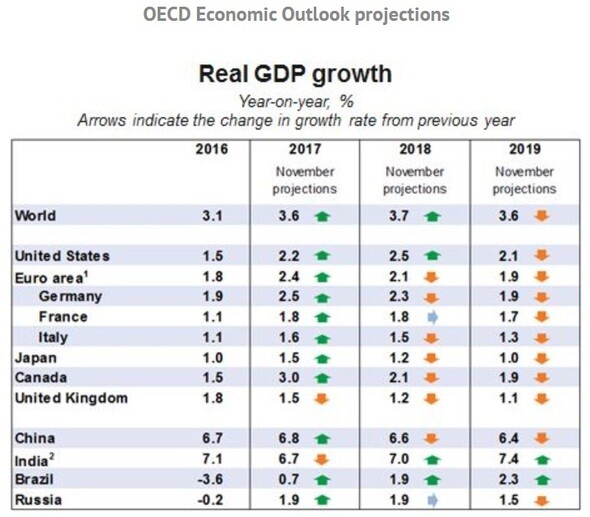hankyoreh
Links to other country sites 다른 나라 사이트 링크
OECD raises projection for South Korean growth rate to 3%

The Organisation for Economic Co-operation and Development (OECD) has adjusted its projection for South Korea’s economic growth rate for next year up to 3.0%. In June, it had projected a growth rate of 2.8%, reflecting the contraction of spending caused by China’s retaliation for THAAD. But the OECD believes that South Korea can sustain a growth rate of 3% thanks to the recovery of world trade and an expansionary fiscal policy.
In the OECD Economic Outlook, which was released on Nov. 28, the OECD predicted that South Korea’s economy would grow by a rate of 3.2% this year and 3.0% next year. Compared to this past June, the projected rate for this year was up 0.6 points and the projected rate for next year was up 0.2 points. The report identified improving exports in key industries such as semiconductors and progress in the government’s innovative growth policy as positive factors, and the increasing cost of wages caused by a higher minimum wage and sluggish investment resulting from a hike in the corporate tax rate as negative factors.
The global economy is projected to grow by 3.6% this year and 3.7% next year. That is a slight increase from previous figures, which projected 3.5% and 3.6% growth, respectively. As evidence for these predictions, the OECD cited predictions for a simultaneous recovery in advanced and developing countries, backed by increasing global trade, including in Asia and Europe.
The OECD recommended that, for South Korea to increase its economic productivity, a stronger role for fiscal policy needs to be accompanied by structural reforms. The income-led growth strategy of the administration of South Korean President Moon Jae-in needs to be supported by reforms to increase productivity, and fiscal policy should also be focused on enhancing productivity, the report argued. The viewpoint of the OECD is that this will require structural reforms in the commodity market and the labor market. The OECD emphasized that gradually lowering the level of monetary accommodation will also help control inflation and household debt.
By Jung Eun-joo, staff reporter
Please direct questions or comments to [english@hani.co.kr]

Editorial・opinion
![[Column] Season 2 of special prosecutor probe may be coming to Korea soon [Column] Season 2 of special prosecutor probe may be coming to Korea soon](https://flexible.img.hani.co.kr/flexible/normal/500/300/imgdb/original/2024/0426/3317141030699447.jpg) [Column] Season 2 of special prosecutor probe may be coming to Korea soon
[Column] Season 2 of special prosecutor probe may be coming to Korea soon![[Column] Park Geun-hye déjà vu in Yoon Suk-yeol [Column] Park Geun-hye déjà vu in Yoon Suk-yeol](https://flexible.img.hani.co.kr/flexible/normal/500/300/imgdb/original/2024/0424/651713945113788.jpg) [Column] Park Geun-hye déjà vu in Yoon Suk-yeol
[Column] Park Geun-hye déjà vu in Yoon Suk-yeol- [Editorial] New weight of N. Korea’s nuclear threats makes dialogue all the more urgent
- [Guest essay] The real reason Korea’s new right wants to dub Rhee a founding father
- [Column] ‘Choson’: Is it time we start referring to N. Korea in its own terms?
- [Editorial] Japan’s rewriting of history with Korea has gone too far
- [Column] The president’s questionable capacity for dialogue
- [Column] Are chaebol firms just pizza pies for families to divvy up as they please?
- [Column] Has Korea, too, crossed the Rubicon on China?
- [Correspondent’s column] In Japan’s alliance with US, echoes of its past alliances with UK
Most viewed articles
- 1‘We must say no’: Seoul defense chief on Korean, USFK involvement in hypothetical Taiwan crisis
- 2[Column] Season 2 of special prosecutor probe may be coming to Korea soon
- 3N. Korean delegation’s trip to Iran shows how Pyongyang is leveraging ties with Moscow
- 4Amnesty notes ‘erosion’ of freedom of expression in Korea in annual human rights report
- 5Korea sees more deaths than births for 52nd consecutive month in February
- 6[Reportage] On US campuses, student risk arrest as they call for divestment from Israel
- 7[Editorial] New weight of N. Korea’s nuclear threats makes dialogue all the more urgent
- 8‘Weddingflation’ breaks the bank for Korean couples-to-be
- 9Division commander ordered troops to enter raging flood waters before Marine died, survivor says
- 10[Editorial] Korea’s surprise Q1 growth requires objective assessment, not blind fanfare